Review: SWEAT tests loyalty and identity at the Geary Theater

American Conservatory Theater digs deep into the American working-class psyche with Sweat by Lynn Nottage. The 2017 Pulitzer Prize-winning play probes the collapse of the American Dream as experienced by a multi-generational group of factory workers in Pennsylvania, at the southeastern edge of the Rust Belt's bleeding heart.
The play spends most of its time in a bar in Reading, exquisitely realized by scenic designer Andrew Boyce and gilded by the Hana S. Kim projections and lighting by Allen Lee Hughes. It is part community center and part confessional for its denizens, and the setting for what happened to them in 2000 and how it shapes their now, actually 2008 at the height of the Great Recession. It is that place between hard work and unsatisfying home lives for an initially close-knit trio of women. Late in the play, long after these relationships have been stretched beyond breaking, one character asks of another, "Why did you come here?" The other answers, simply, "It's my birthday. It's what we do."
Tracey (Lise Bruneau), Jessie (Sarah Nina Hayon), and Cynthia (Tonye Patano) spend their days in a male-dominated steel industry and most nights under the kindly but watchful eye of Stan (Rod Gnapp), a steelworker-turned-bar manager, sidelined by a disabling injury. Tracey and Cynthia have sons - Jason (David Darrow) and Chris (Kadeem Ali Harris) - who also work the plant. Jessie nurses her off-hours loneliness with gimlets and Brucie (Chiké Johnson), Cynthia's ex and father of Chris, struggles with unemployment and addiction. Oscar (Jed Parsario), Stan's ambitious but under-employed bar back, and Evan (Adrian Roberts), a no-nonsense parole officer, complete the ensemble.
Sweat neither romanticizes nor demonizes the factory workers or their situations. You know most of these people voted for Trump, but they are at worst, desperate, not deplorable. They face hard choices with honesty and determination, understanding the limited cards they have been dealt and keen to overcome them. When a management job becomes available both Tracey and Cynthia apply knowing that despite their qualifications and experience, floor workers are seldom promoted and women even less so. The so-called opportunity cracks the previously solid friendships and racism rears its head more than once during the evening.
Nottage asks a lot of hard questions. What do you do with confidential information that could help your friends but cost you your job if shared? Is it right to better your own situation if others will not take the opportunities in front of them no matter how meager? At what point does survival outweigh loyalty? What good is a resistance from within if you are really powerless? When is forgiveness less painful than resentment? Answers are, naturally, in short supply.
The ensemble of actors is strong. Bruneau brings complementary shades of swagger and insecurity, pride and delusion to the ostensible leader of her pack, mining betrayal and a bitterly aggrieved posture when things turn against her. Hayon is as slyly comic here as in her recent turn in The Gangster of Love at Magic Theatre, with an overlay of pathos that will touch your heart. Patano, so memorable in the Showtime series Weeds, is strong in Act I, setting boundaries with her ex-husband and rallying her team, and poignant in Act II ameliorating her losses at home and work with dignity, falling just a bit short in her defense of her workplace decisions.
Gnapp, a Bay Area favorite, delivers another of his stellar "everyman" characters, a guy with deep, complex internal layers presented in an affable, accessible, and deceptively simple exterior. He also builds a nicely caring mentorship with Parsario who has a believably hard time understanding white peoples' problems. As the sons and best friends, Harris and Darrow are good pals who hit a surprising hiccup in their bromance and a turn of events that changes their lives. Roberts, always fun to watch, does what he can with his tertiary role, and Johnson creates some deeply uncomfortable spaces in which to consider the odds stacked against black men in America.
Productions filled with constructs as complex as those in Sweat do not direct themselves and Loretta Greco, artistic director at Magic Theatre, has done an exceptional job of threading all the cross-hatched elements of gender politics, union breaking and labor practices, racial inequity, and class considerations into a cohesive whole. If it frays anywhere it is in the family dynamics between Bruneau and Darrow that do not ring true.
The question at the end of this evening is whether the likely liberal and largely privileged audiences usually ensconced in the Geary Theater will lean forward enough to empathize and find something of themselves in the hard-working men and women sharing brews in this careworn pub where everyone knows not only your name, but your heart and soul. They should.

Sweat runs through October 21 at American Conservatory Theater.
TICKETS | Images: Kevin Berne
Reader Reviews

Videos

